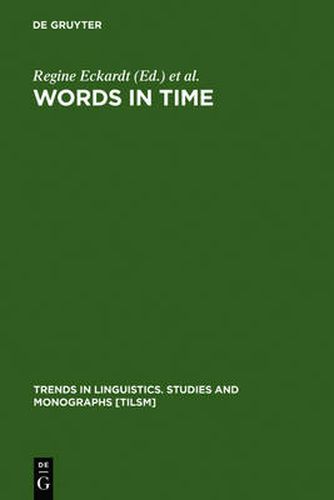Readings Newsletter
Become a Readings Member to make your shopping experience even easier.
Sign in or sign up for free!
You’re not far away from qualifying for FREE standard shipping within Australia
You’ve qualified for FREE standard shipping within Australia
The cart is loading…






This title is printed to order. This book may have been self-published. If so, we cannot guarantee the quality of the content. In the main most books will have gone through the editing process however some may not. We therefore suggest that you be aware of this before ordering this book. If in doubt check either the author or publisher’s details as we are unable to accept any returns unless they are faulty. Please contact us if you have any questions.
Meanings of words are constantly changing, and the forces driving these changes are varied and diverse. Linguistic analyses are usually concerned with language-internal processes, while investigations of language-external historical developments tend to disregard linguistic considerations. It is evident, however, that an investigation of diachronic semantics will have to consider both sides: a specific theory of meaning including a proper place for lexical semantics on the one hand, and incorporate knowledge about the world and the social and cultural environment of speakers who use language as a tool for communication on the other.
The collection focuses on meaning change as a topic of interdisciplinary research. Distinguished scholars in diachronic semantics, general linguistics, classical philology, philosophy of language, anthropology and history offer in depth studies of language internal and external factors of meaning change. This broad range of perspectives, unprecedented in research publications of recent years, is a pioneering attempt to mirror the multi-facetteous nature of language as a formal, social, cognitive, cultural and historical entity. The contributions, each exploring the research issues, methods and techniques of their particular field, are directed towards a broader audience of interested readers, thus enhancing interdisciplinary exchange.
$9.00 standard shipping within Australia
FREE standard shipping within Australia for orders over $100.00
Express & International shipping calculated at checkout
This title is printed to order. This book may have been self-published. If so, we cannot guarantee the quality of the content. In the main most books will have gone through the editing process however some may not. We therefore suggest that you be aware of this before ordering this book. If in doubt check either the author or publisher’s details as we are unable to accept any returns unless they are faulty. Please contact us if you have any questions.
Meanings of words are constantly changing, and the forces driving these changes are varied and diverse. Linguistic analyses are usually concerned with language-internal processes, while investigations of language-external historical developments tend to disregard linguistic considerations. It is evident, however, that an investigation of diachronic semantics will have to consider both sides: a specific theory of meaning including a proper place for lexical semantics on the one hand, and incorporate knowledge about the world and the social and cultural environment of speakers who use language as a tool for communication on the other.
The collection focuses on meaning change as a topic of interdisciplinary research. Distinguished scholars in diachronic semantics, general linguistics, classical philology, philosophy of language, anthropology and history offer in depth studies of language internal and external factors of meaning change. This broad range of perspectives, unprecedented in research publications of recent years, is a pioneering attempt to mirror the multi-facetteous nature of language as a formal, social, cognitive, cultural and historical entity. The contributions, each exploring the research issues, methods and techniques of their particular field, are directed towards a broader audience of interested readers, thus enhancing interdisciplinary exchange.